A Few Questions For Valley Action’s Gloria DiFulvio and Elaine Fronhofer
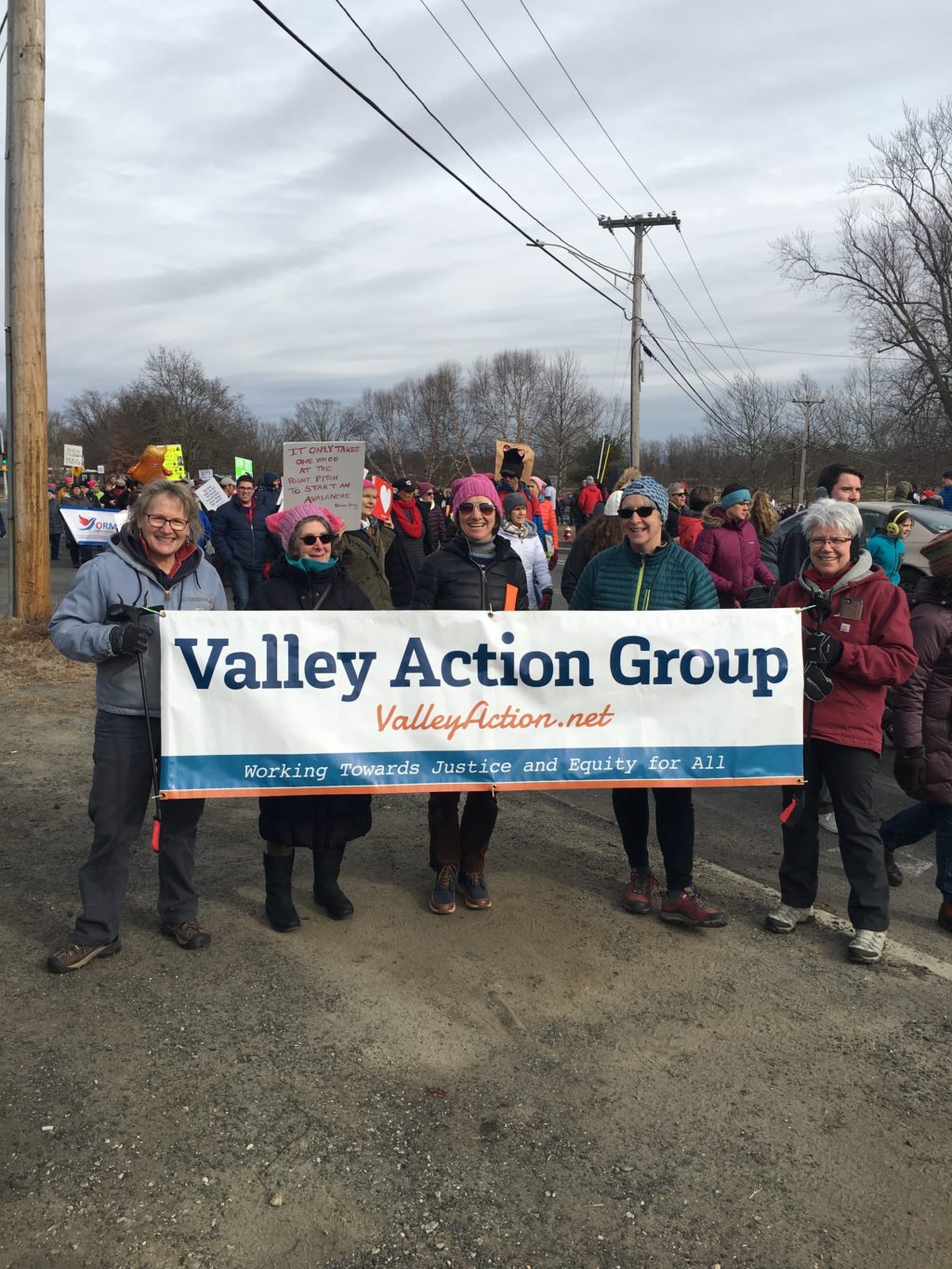
Photo: Valley Action
A Few Questions For… is an occasional feature of the Indy, aimed at helping our readers get to know the people who make things happen in our town and our Valley. We feature members of town government and key town employees, along with civic leaders, activists, local educators, prominent volunteers, and residents who are not necessarily well-known. A Few Questions For…has been on hiatus for several months. This week, we relaunch the feature with a conversation with two of the founders of Valley Action.
Valley Action (VA) has been engaged in the work of progressive change and resistance since election day 2016. Just a few days after that election, more than 100 people gathered in Gloria DiFulvio’s living room to brainstorm what they could do to push back against the coming Trump agenda. That initial meeting quickly morphed into Valley Action, an organization that has been meeting every month since November 2016 to undertake the work of preserving democracy and promoting justice. While many groups formed in those early days of the Trump presidency, few persisted over the ensuing four years. Valley Action continues the work of supporting progressive change to this day. I spoke over Zoom on March 24, 2021 with Gloria DiFulvio and Elaine Fronhofer who, along with Bernadette Harrigan, were three of the founders of Valley Action and are still organizing the meetings and the actions taken.
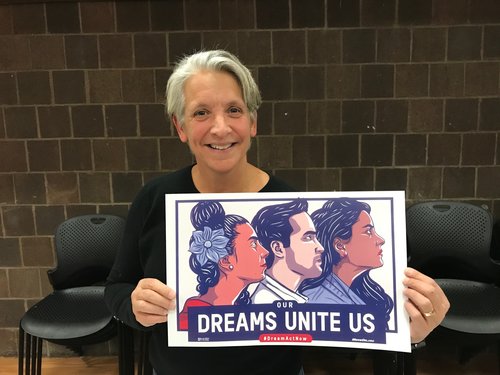
Gloria DiFulvio is Director of the Undergraduate Public Health Sciences Program in the UMass School of Public Health and Health Sciences, and formerly taught public policy and community organizing in the UMass Community Scholars Program (CSP). She chose that work to help bring up the next generation of public health workers with a focus on justice and equity as it relates to health and to help them link the political world and the social world to health.
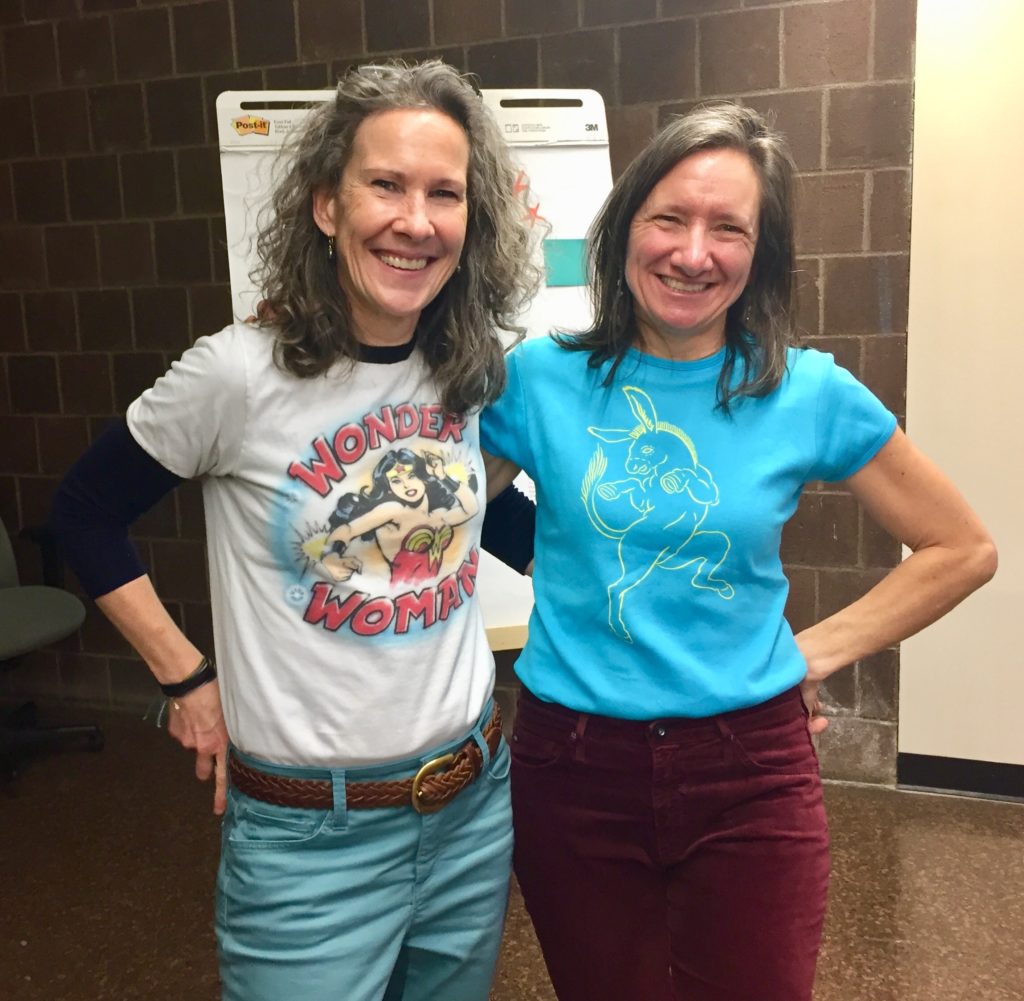
Elaine Fronhofer is an Amherst-based criminal defense attorney who handles appeals of indigent defendants throughout the Commonwealth of Massachusetts. It’s a job, she says, that allows her to help people who are facing adversity and who society hasn’t always treated very fairly and also to work on racial justice issues. She says that prior to the advent of Trump, that she had dabbled in political campaigns. She was also an Amherst Town Meeting member for a few terms.
Gloria and Elaine first met at Northampton Community Rowing, where Gloria has been a member since 2012 and Elaine since 2015.
Amherst Indy: Would you share with us VA’s origin story?
Gloria: I was so despondent on that Wednesday morning after the election. I saw that Trump was winning and was hoping for a miracle and a different outcome and so I stayed up waiting for it to happen. Of course it didn’t happen. And I thought about the community organizing work I was teaching in the CSP and I thought, “I shouldn’t just be teaching this, I need to do something.” So I texted a few friends and they immediately said they were in. And we had a meeting at my house the next week — maybe 50 people….
Elaine: many more! There were a lot of people there.
G: …so we met at my house once a month beginning the week after the election and it just got too big to continue meeting there. And so we moved it out of the house — first to the Jones Library and then to the Bangs Center.
E: …and I was charged with finding a place large enough to meet, which wasn’t so easy in Amherst.
G: I don’t know that at the outset that any of us were confident that we knew what it was we wanted to do and of course it changed over the months and years but we were clear from the outset that we weren’t going to be a book club and read about how we got here. Our focus from the beginning was action.
When we first got started, meetings involved people breaking into groups around a particular topic, and they would brainstorm about how they might mobilize around a particular issue. So we had, for example, a corner of the room working on the environment. And those people would share about the environmental groups they knew that were working in the Valley and what they were doing and who we might work with and at the end of the evening we would have the groups report out.
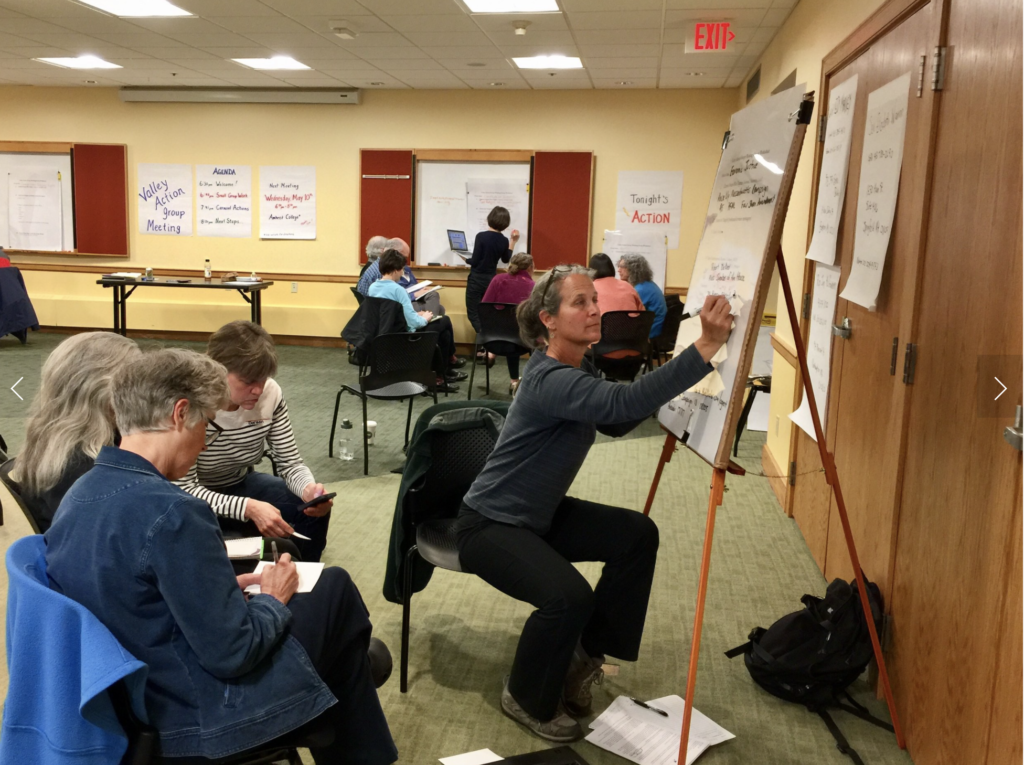
Prepared Actions — Emphasizing Wins
E: But after a short while we adopted a process where the leadership team would pre-prepare actions. The meetings would start with a discussion of some recent wins, where the actions of resistance groups had made a difference, and then we would introduce an action that we had prepared, and then we would begin to undertake that action together.
And these actions were well thought out. So, for example, we decided to take on the hotels that were being used to imprison people at the border, and we would plan out precisely how to reach out to them to demand that they not do that and not be part of that process. And we would pre-write the scripts and provide the phone numbers so people would arrive and could begin to take action that evening.
And talking about wins was really important. It let people know that all of these resistance groups including ours WERE having an impact –and that we could succeed. The news at the time was so crushingly bad that it helped people realize they could make a difference and they HAD made a difference.
I also want to emphasize that we did this every single month since Trump was elected except for one month at the start of the pandemic when we couldn’t get a remote meeting set up on short notice. But even then– we sent the actions out over email. Since then we’ve been meeting over Zoom.
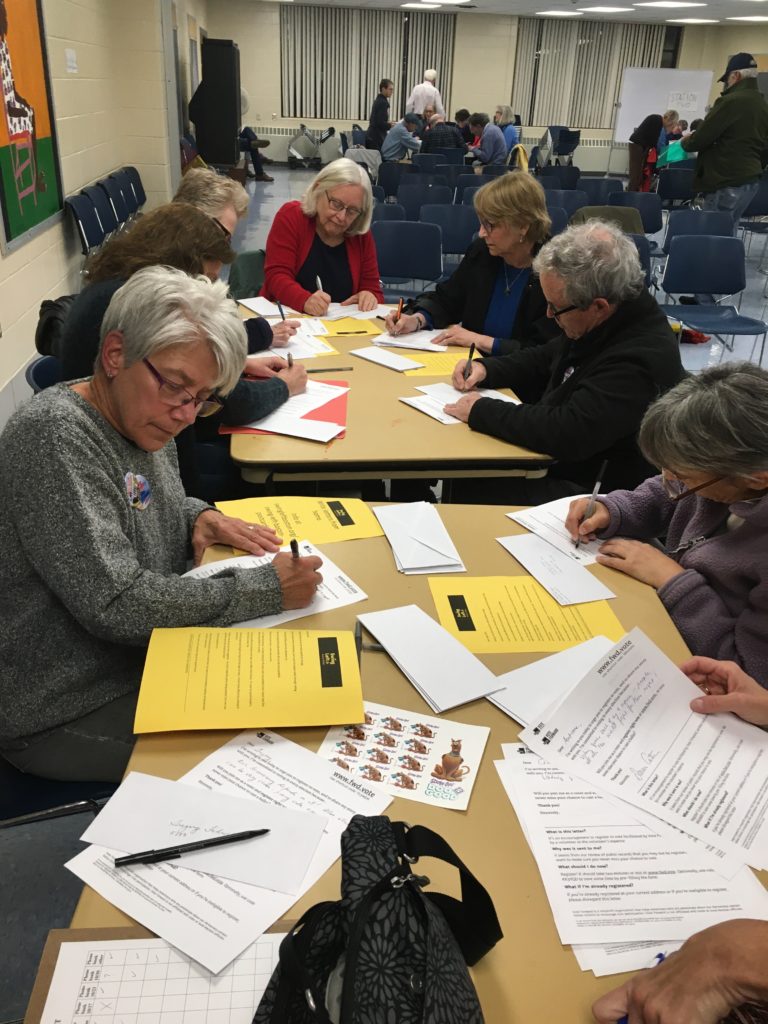
G. Another part of our process was that we brought in guest speakers from resistance or justice organizations like Jobs with Justice or the Pioneer Valley Workers Center, and experts and activists to talk about issues like immigration and voting. And we recently have been in discussions with people from Amherst and Northampton who are working to promote changes in policing. We also brought in people from Senator Ed Markey’s Office to talk about the ways in which phone calls and letters can be influential. So our process involved getting educated about the issues and also connecting with people who were actively organizing for change.
E. The big shift for us came with the 2018 mid-term election when we started to focus on making sure that the Democrats would retake the house. And VA spent a lot of time focusing on flipping one seat in New York State (NY-19). We worked with a broad coalition of many resistance groups that joined up with the Democratic party, all focused on taking back the House – and we did!
AI: Could you say a few words about who is VA – and has it been constant over the last five years?
G: I think it’s a bit of both. There’s a core group of about 20 who have come to meetings consistently throughout. And then there are people who come more frequently and less frequently. And there are new folks who show up looking for a way to make a difference. And sometimes we’ll get a representative from another resistance group that wants to make a connection or to see how we are doing things – so those kinds of relationships develop too.
AI – How do people find out about it?
G. Our emailing list is about 250 people. And we get listed on other activist lists like 413 Staying Connected. And there is heightened interest near election time. So some of it is word of mouth and some if it is getting our name out there in public spaces.
G: The Indivisible Guide has been really important in all of this and in helping us and others know what kinds of actions work and how to mobilize them.
AI: To what do you attribute your longevity? How have you persisted where so many other resistance groups did not?
G: One key, I think, was our leadership team. We had enough leaders who were committed that there was always someone there to keep the ball rolling, to keep the momentum going. And we have a distributive leadership model where we shared the burdens and that helped prevent burnout.
E: And people at the meeting would come with suggestions that we ought to be doing other things or more things and we would talk it over among the leadership team and oftentimes come to the conclusion that our model was working and that we should stick with what’s working for us and not make it overly complicated.
VA is the group of people who show up and do the work. There’s a long list of folks who do this and it has changed over time but I do want to take this opportunity to mention three people who have done a lot of work for VA: Doreen Catterson, a founding member, who worked with us for years, as well as Laurie Shannon and Suzanne Everden, two stalwart members who are critical to making VA successful.
AI – So many of the groups that got started in November of 2016 began to fade away six months in. You’d go to a meeting in a big hall and the room would be packed with people and with each successive meeting the size of the group got smaller and then the meetings would get spaced further apart and then the group would just stop meeting. That didn’t happen to you.
G. We did lose a lot of people. We started out with big meetings. And we lost folks for all kinds of reasons but we stuck with the idea that we’re going to do something and if other folks show up to join us – that’s great. And I think the people who continued to show up did so because they knew that we would be there and because we would offer them something concrete to do.
You know people show up in the evening and its late and they are tired and what we can offer them is a report on the key actions that other groups are undertaking around the country and what is working. And then we can give them something concrete that they can do that will make a difference.
AI – Most of your early work seems to have been around electoral and legislative stuff. Is that still the case?
G. I think that depends on the context. We did that outreach around the use of private hotels in detaining folks at the border. We do a lot of postcards and sometimes thank you notes because there are people who need to be thanked.
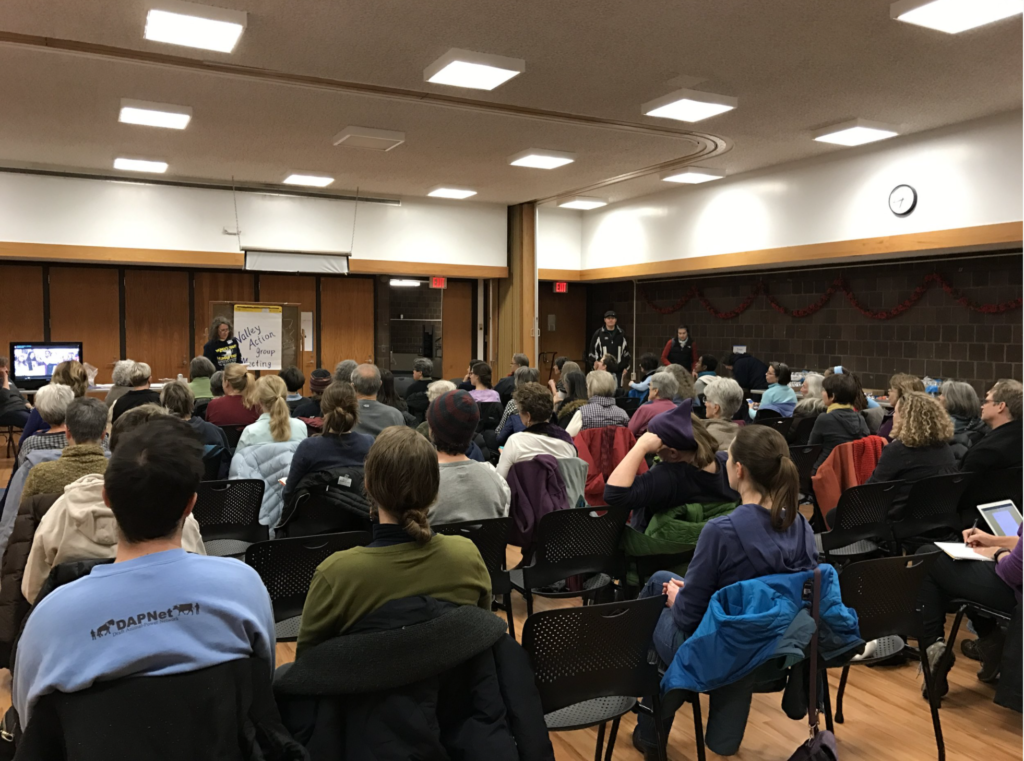
E. And we attend a lot of vigils and rallies. There was a lot of that in response to the murders of Geroge Floyd and Breonna Taylor. We were co-sponsors of the March For Racial Justice in Holyoke. But our primary focus is still on electing officials who represent our values and legislation that does the same.
AI: Could you highlight one campaign that was particularly gratifying?
E. For me, it was our work to flip the NY-19 Congressional District that was held by John Faso and was won by Antonio Delgado. We did a ton of work on that. Lots of phone banking. Collecting voter information. Post-carding and then traveling out to the district for canvassing. That was a real uplifting success – especially in the midst of the day-to-day reports of all the damage that the Trump administration was doing.
G. There are three things that especially stand out for me. First, the Delgado win. And early on we did a lot of work around health care and saving the Affordable Care Act. And we did a lot of work around Biden’s election. And it was so gratifying to send out a message, finally, that Trump’s presidency was over.
AI: So where to now?
E. Trump of course is not so much the cause but a symptom of the challenges that we face. He’s gone but all of those underlying problems, those challenges to democracy and justice are still with us. So the number one priority for me is that we need to get HR1 -the For the People Act (HR 1) passed. (HR 1 is a comprehensive voting rights bill that would restore rights that the Supreme Court gutted from the original Voting Rights Act and counter the wave of voter suppression laws now sweeping state legislatures. It has passed in the House but needs to pass in the Senate).
Gloria and I and a few others are also trying to begin to work on disinformation and how that works and how that can be subverted and what we need to know to do that. And I’m looking for another key House seat to flip. I’m thinking maybe Elise Stefanik (NY-21), an extreme Trump loyalist. She represents the district where I grew up and I have begun to work with a group from that district who are looking to flip it.
G. We’re working on keeping Democratic control of the House and the Senate. And we’re interested in DC statehood. And I see that for me personally, that voting rights will be prominent in the work that I do and HR1 will take care of a lot of my concerns if we can get it passed.
E. HR 1 must be passed and before the mid-terms. If it’s not passed, minority rule will prevail in all three branches of government. Each branch will be locked in for the GOP for at least a decade. So the future of democracy depends on this.
G. I have one more story to share. Some of us adopted states for the election. I adopted Florida and Arizona. And in working the phones for those two states it really underscored for me how important (and how insecure) voting rights are and how privileged I have been not to have that right challenged during my life in NY and now in MA and how that’s not the case for people in those states where I phone banked.
AI – Do you want to say something about what you’ve learned from doing the work?. Do you think that the work that you have done has better prepared you and VA members to recognize fascism or autocracy when it’s here and empowered them to do something about it.?
E. I think we, Gloria, Bernadette, and I came to this with a little more political experience than most of the people who come to our meetings. So, we had an opportunity to use that experience to help guide people through the process. And because of my involvement with VA I’ve learned a lot – about how to effect change, how to strategize to make change happen, how to motivate people.
G. We managed to avoid the dictatorship but we could be one election away from it. I’ve learned that this is a life-long journey and that the aspiration for democracy is ongoing and that it should not be taken for granted and I have really internalized that.
AI : Would you like to pitch your next meeting?
E: April 14 on Zoom. 6:30 PM. If people email me, I will send them a link. efronhofer@gmail.com
There are critical things to be working on right now – most notably the assault on voting rights. The fact that Trump is not in office right now does not mean that there is not a huge threat hanging and there are plenty of reasons for getting active and plenty of opportunities.
Here’s an invitation from the VA website
If you are interested in equity and justice and you live in Western Massachusetts please join us. We meet one time per month as a full group, and keep each other informed in between meetings. We would love to see you at our next meeting! See some of the past successful actions the group has been involved in over the past 3 years.
AI: Thanks to both of you and to Bernadette and all of the folks in VA for all of the good work that you have done and continue to do.
